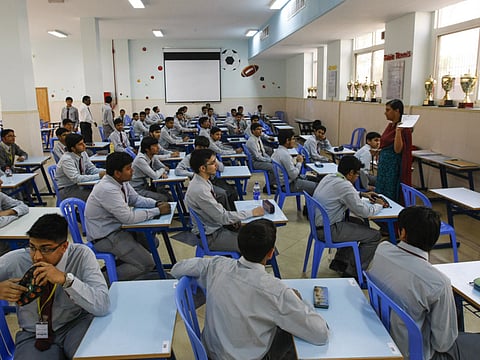Dubai private schools collect Dh7.5b in tuition fees
Latest KHDA figures show total school revenue from fees rose by Dh700 million this academic year

Dubai: Private schools in Dubai earned Dh7.5 billion in tuition fees in the current 2017-18 academic year — Dh700 million more than the Dh6.8 billion collected last academic year — a new report shows.
The Dubai Private Education Landscape 2017/18 report, released by the Knowledge and Human Development Authority (KHDA) in Dubai, also said 53 per cent of students pay less than Dh20,000 in annual tuition fees, 4.5 per cent fewer than last school year.
According to the report, titled ‘Doing Well, Being Well: The Health and Happiness of Dubai’s Private Schools’, the average school fee is Dh26,865 (without taking into account discounts).
The well-being of our schools and students is a key priority for us and this is reflected in the growth of the education sector. Dubai is home to 194 schools.”
There are currently 194 private schools in Dubai, teaching 281,432 pupils — a 2.9 per cent growth in enrolment. This academic year, 11 new private schools opened in Dubai.
Fees frozen
The newly released figures come weeks after the Dubai Executive Council announced a freeze on private school fee increases in Dubai for the coming academic year (2018-19), which starts in September, to ease the financial burden on parents.
The announcement on June 6 was welcomed by parents, who had been expecting eligible schools to increase fees, as is usually the case. However, a number of schools eligible to increase fees had said before the June 6 announcement that they would freeze or reduce fees.
In Dubai, school fee increases are tied to the Education Cost Index (ECI), announced by Dubai Statistics Centre, and the school’s KHDA inspection rating. Together, the system is known as the School Fees Framework. The higher the school rating, the higher the allowed fee increase (in multiples of ECI).
Private school fees in the UAE are one of the highest in the world, costing parents an average of Dh528,486 per child (from preschool to primary and secondary school), according to a report by Zurich in August 2017.
Student census
The latest KHDA report also cites data from 2017 Dubai Student Well-being Census of students in grades six to nine, which suggests 84 per cent of students are “happy most of the time”, while 87 per cent feel “optimistic”.
Dubai is home to students from 182 nationalities, with 16 different curricula on offer. With new schools opening each year, at various price points, “students today have more opportunities than ever as school operators look at new ways to attract students and provide innovative offerings”, said Dr Abdullah Al Karam, director-general of the KHDA. His comments came in a statement about the new report.
Dr Al Karam said: “The well-being of our schools and students is a key priority for us and this is reflected in the growth of Dubai’s education sector. Dubai is home to 194 schools and we are continuing to see a strong demand for high quality education.”
Higher education
The report also highlighted developments in higher education, which saw a 4.84 per cent enrolment growth this academic year. Around 30,375 students attend 32 universities in free zones in Dubai (mainly Dubai International Academic City).
By far, the business field is the most popular choice of study, accounting for 59.3 per cent of all enrolments in higher education. The second most popular field is engineering (14.8 per cent), followed by “media and design” (6.7 per cent).
The figures for this academic year show there were virtually no takers (0.1 per cent) for “health and medicine” studies.
Overall, the report suggests “positive trends” in the private education landscape of Dubai.
Dr Al Karam said: “The remarkable progress of our schools and universities is a reflection of Dubai’s status as an attractive education destination for parents. The positive trends are a strong indication of the trust placed by parents in our efforts to promote positive education and well-being across schools.”
Sign up for the Daily Briefing
Get the latest news and updates straight to your inbox



